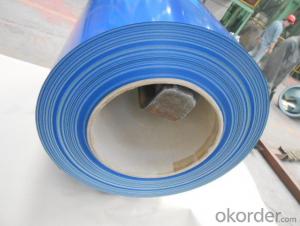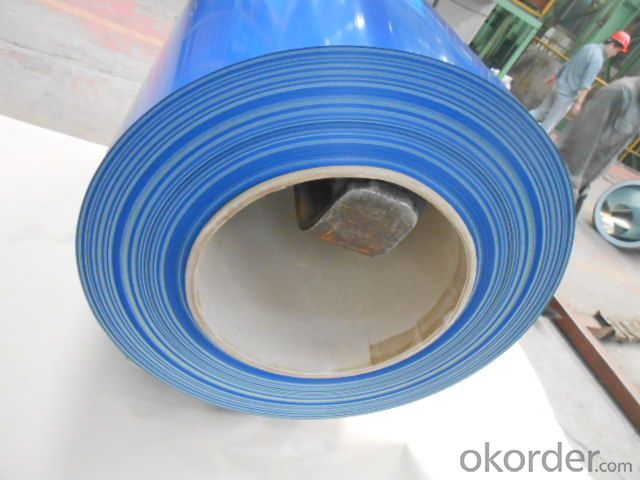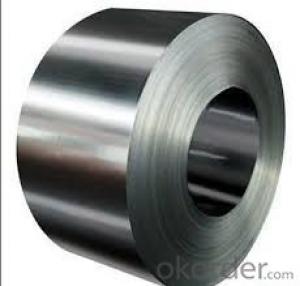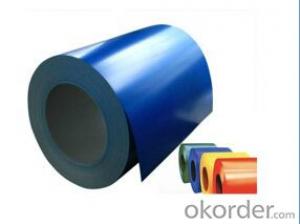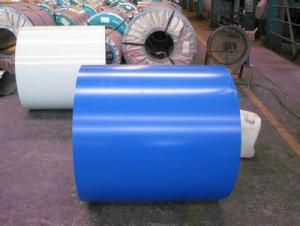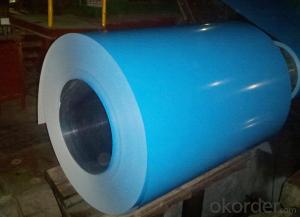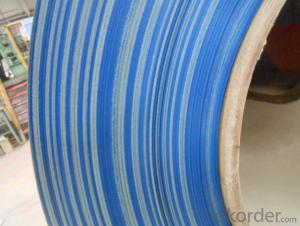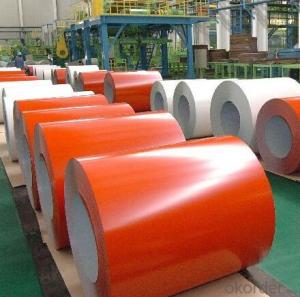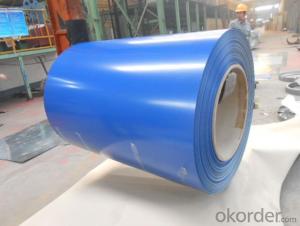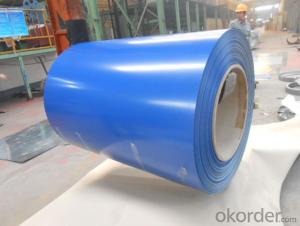Pre-Painted Galvanized Steel coil---Royal Blue
- Loading Port:
- Shanghai
- Payment Terms:
- TT OR LC
- Min Order Qty:
- 100 m
- Supply Capability:
- 10000 m/month
OKorder Service Pledge
OKorder Financial Service
You Might Also Like
1. Pre-Painted GI/GL Steel Coil Description:
With GI as base material, after pretreatment (degrease and chemical treatment ) and liquid dope with several layers of color, then after firing and cooling, finally the plate steel is called pre-painted galvanized (aluzinc) steel. Pre-painted galvanized steel is good capable of decoration, molding, corrosion resistance. It generally displays superior workability, durability and weather resistance.
2.Main Features of the Pre-Painted GI/GL Steel Coil:
• Excellent process capability
• Smooth and flat surface
• Workability, durability
• Excellent heat resistance performance
• High strength
• Good formability
• Good visual effect
3.Pre-Painted GI/GL Steel Coil Images
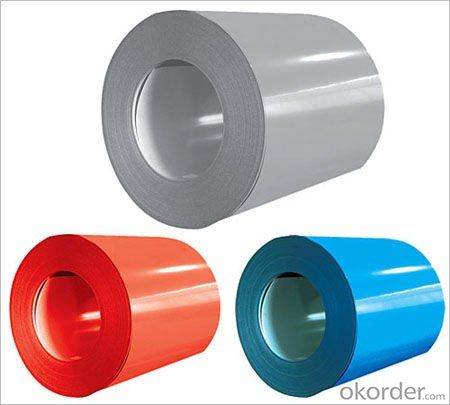
4.Pre-Painted GI/GL Steel Coil Specification
Standard: AISI, ASTM, BS, DIN, GB, JIS
Grade: DX51D, DX52D
Thickness: 0.17-2.0mm
Brand Name: KMRLON
Model Number: coil
Type: Steel Coil
Technique: Cold Rolled
Surface Treatment: Coated
Application: Boiler Plate
Special Use: High-strength Steel Plate
Width: 20-1250mm
Length: customized
commoidty: pre-painted galvanized steel coil
Thickness: 0.13-4.0mm
width: 20-1250mm
zinc coating: 40-180g/m2
printing thickness: top side: 20+/-5 microns, back side: 5-7 microns
color: all RAL color
surface treatment: color coated
coil weight: 4-7 tons
coil ID: 508/610mm
packaging: standard seaworthy packing
5.FAQ of Pre-Painted GI/GL Steel Coil
1. What’s the application of this product?
Roof, roof structure, surface sheet of balcony, frame of window, etc.
2. What’s the brand of the paint?
We use the best brand of all of the word—AKZO.
3. How to guarantee the quality of the products?
We have established the international advanced quality management system,every link from raw material to final product we have strict quality test;We resolutely put an end to unqualified products flowing into the market. At the same time, we will provide necessary follow-up service assurance.
4. How long can we receive the product after purchase?
Usually within thirty working days after receiving buyer’s advance payment or LC. We will arrange the factory manufacturing as soon as possible. The cargo readiness usually takes 15-25 days, but the shipment will depend on the vessel situation.
- Q: How are steel coils used in the manufacturing of shock absorbers?
- Steel coils are used in the manufacturing of shock absorbers primarily as a spring component. These coils provide the required strength and flexibility to absorb and dampen the impact and vibrations experienced by the vehicle. When compressed or expanded, the steel coils store and release energy, ensuring a smoother and more controlled ride for the driver and passengers.
- Q: What is the minimum thickness of a steel coil?
- The minimum thickness of a steel coil can vary depending on the specific requirements and standards set by the industry. However, in general, the minimum thickness of a steel coil is typically around 0.15 millimeters or 0.006 inches.
- Q: How do steel coils contribute to the HVAC industry?
- The HVAC industry relies heavily on steel coils, which play a critical role in the functioning and efficiency of HVAC systems. These coils, often made from high-quality steel like stainless steel or galvanized steel, ensure durability and resist corrosion. One way steel coils contribute to the HVAC industry is by facilitating heat transfer. HVAC systems use coils to transfer heat between the air and a refrigerant. For instance, in air conditioning units, the evaporator coil absorbs heat from the indoor air, while the condenser coil releases heat to the outside air. The steel coils in these units provide a large surface area for efficient heat exchange, allowing for effective cooling or heating of the air. Furthermore, steel coils contribute to the energy efficiency of HVAC systems. By maximizing heat transfer, these coils enable HVAC systems to operate at optimal performance levels while consuming less energy. This not only reduces energy costs for users but also makes HVAC systems more environmentally friendly by minimizing energy consumption and greenhouse gas emissions. Steel coils in HVAC systems also play a role in maintaining indoor air quality. As air passes over the coils, impurities like dust, dirt, or mold can accumulate on the coil's surface. Regular maintenance and cleaning of the coils are essential to prevent the buildup of contaminants that could negatively impact air quality. Properly maintained steel coils ensure clean and healthy indoor air, which is particularly important for commercial buildings, hospitals, and other spaces where air quality is crucial. Additionally, steel coils provide durability and longevity to HVAC systems. Steel is a strong and resilient material that can withstand high temperatures, pressure, and environmental stress. By using steel coils, HVAC systems can operate reliably and efficiently for extended periods, reducing the need for frequent repairs or replacements. Overall, steel coils are indispensable to the HVAC industry. They enable efficient heat transfer, enhance energy efficiency, improve indoor air quality, and provide durability to HVAC systems. Without steel coils, HVAC systems would significantly lose their performance and effectiveness, highlighting the vital role of steel coils in the HVAC industry.
- Q: What is the typical size and weight of a steel coil?
- The specific application and industry play a role in determining the varying size and weight of a steel coil. Generally, steel coils are manufactured with widths that range from 0.5 to 2 meters (1.6 to 6.6 feet) and can weigh anywhere between 1 to 25 metric tons (2,205 to 55,116 pounds). The size and weight of a steel coil are influenced by factors such as the type of steel utilized, the intended purpose of the coil, and the manufacturing method employed.
- Q: How are steel coils used in the production of steel handles?
- Steel coils are used in the production of steel handles by being processed and shaped into the desired handle design. The coils are uncoiled and fed into a machine where they are cut, bent, and formed to create the handle shape. The coils provide the raw material needed for the manufacturing process, ensuring the handles are strong, durable, and able to withstand the required usage.
- Q: What are the properties of high-strength steel coils?
- High-strength steel coils possess several key properties that make them desirable in various applications. These include exceptional tensile strength, excellent formability, and increased resistance to wear, corrosion, and impact. Moreover, high-strength steel coils typically exhibit higher yield and ultimate strength than regular steel coils, making them suitable for demanding structural and manufacturing purposes.
- Q: What are the common coil diameter and weight combinations available for steel coils?
- The common coil diameter and weight combinations available for steel coils vary depending on the specific requirements and industry standards. However, there are some commonly used combinations that are widely available in the market. In terms of coil diameter, the most common sizes range from 24 inches (610 mm) to 72 inches (1829 mm). These diameters are typically used for various applications in industries such as automotive, construction, and manufacturing. Regarding coil weight, the range can vary significantly depending on the type and thickness of the steel being coiled. For hot-rolled coils, the weight typically ranges from 5 to 30 metric tons. Cold-rolled coils usually have weights between 2 to 20 metric tons. Coils with larger weights are commonly used for heavy-duty applications, while lighter coils are preferred for more delicate or precise applications. It is important to note that these are just general guidelines, and the actual coil diameter and weight combinations can be customized based on the specific needs of the customer. Different manufacturers and suppliers may offer a wide range of options to accommodate various industry requirements. Therefore, it's always advisable to consult with the specific supplier to determine the available coil diameter and weight combinations that best suit your specific application.
- Q: I need to know a name of any site which provides information on Steel structures??
- What information are you looking for specifically? information on steel structures could refer to lots of things. Try the American Institute of Steel Construction, or the American Society of Civil Engineers. Google to find them.
- Q: I just bought a dpms ar15 and it says if I shoot steel cases (laquer coated) or foreign ammo it voids the warranty. But before I knew this I bought 200 rounds of Russian steel cased anmo. Think I should just shoot there two hundred and not buy anymore? Some people say all they shoot is steel cased ammo and have no problemAny advice is appreciated
- I am not aware of any catastrophic failures being attributed to Russian Steel cased ammo use. I would recommend checking out the several AR15 message boards and see what everyone who uses it has to say and if anyone has had serious problems. I have personally used Wolf steel case in all of my ARs with no serious issues. I have also fired it in several full auto rifles. What I noticed is that it is dirtier ammo than Winchester or Federal ammunition and I will get an occasional failure to eject. Right now, American production brass cased .223 is $.50-$1.00 or more per round when you can find it.. The Russian Wolf can be found for $.40 or less. Most people shoot whatever they can find and afford and do not worry about the warranty.
- Q: How are steel coils used in the agricultural sector?
- Steel coils are used in the agricultural sector for various purposes such as manufacturing machinery, constructing storage facilities, and creating equipment like irrigation systems and grain bins. They provide strength, durability, and flexibility to support the demanding needs of the agriculture industry.
Send your message to us
Pre-Painted Galvanized Steel coil---Royal Blue
- Loading Port:
- Shanghai
- Payment Terms:
- TT OR LC
- Min Order Qty:
- 100 m
- Supply Capability:
- 10000 m/month
OKorder Service Pledge
OKorder Financial Service
Similar products
Hot products
Hot Searches
Related keywords
